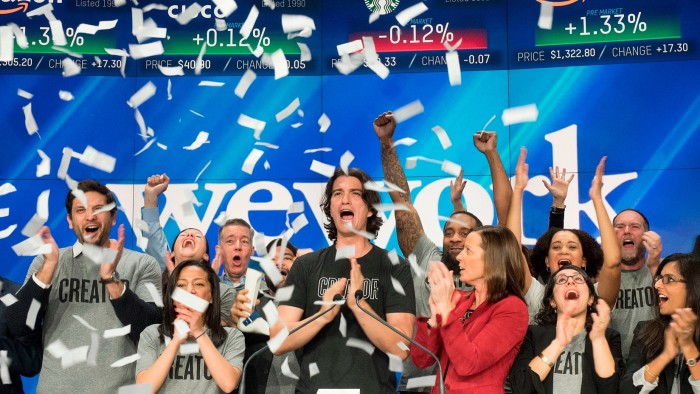Cult of the star business leader is dangerous

Roula Khalaf, Editor of the FT, selects her favourite stories in this weekly newsletter.
The writer is an adjunct lecturer at William & Mary and author of forthcoming book ‘The Confidence Map’
With all the attention on Sam Bankman-Fried and the crypto collapse du jour, it feels as if the crowd is missing the big picture.
If we step back and look at the major collapses of organisations over the past five years, they are different from other meltdowns. When the dot.com and housing market bubbles burst, what we witnessed was the failure of institutions that then resulted in a subsequent crisis of confidence in their leaders.
Enron’s demise took down Ken Lay and Jeffrey Skilling, while WorldCom’s failure upended Bernie Ebbers. In 2008, banking failures led to the ousting of bank chief executives. We witnessed a “Lehman moment” rather than a “Fuld finale”.
But in this cycle, what we are seeing is the downfall of supersized dream salesmen — a collection of Harold Hills right out of the 1960s film The Music Man — whose personal collapses are taking institutions down with them. (Think Adam Neumann, Markus Braun, Trevor Milton, Lex Greensill, Bill Hwang, Do Kwon, and now Bankman-Fried.)
In every case, attention turned first to the outlandish promises and audacious oversteps of a single individual and then to the perilous financial consequences for their organisations. It was the failings of a bold name atop the marquee that closed the entire show.
In an era awash with “move fast and break things” business strategies and social media influencers, I suppose our fascination with disruptive C-suite storytellers shouldn’t be all that surprising. Today’s technology and free-flowing capital access has enabled individuals to become huge stars like never before.
With that supersized overnight success, though, came a collection of shortcomings that are only now being exposed.
First, these individuals tend to govern without the usual checks and balances. Whether through highly concentrated shareholdings or share-rights, presumed genius or outright aggression, they call all the shots.
Second, blind loyalty was all but a requirement — from employees, capital providers and customers. Pushback was non-existent and doubters were ridiculed for their disbelief.
Third, these individuals were surrounded by loyal and adoring fans. Rock musicians never had it this good.
On the surface, this all looked unstoppable. The founders and chief executives seemed to wield power in the style of autocrats or cult leaders.
The challenge with cults, though, is that they foster environments of compliance, not confidence. Only the leader has certainty and control. Everyone else is powerless. Moreover, whatever certainty exists results from obedience to that individual.
Provided the benefits of compliance and loyalty are high — and the punishment for non-compliance especially brutal — such an environment can be easily sustained.
Problems quickly arise, though, when those factors are reversed. Extreme power is either absolute or non-existent. Environments of powerlessness and certainty are inherently binary. There’s no middle ground. And in that context, a collapse in confidence comes quickly.
The failures we’ve seen have been treated by investors as one-offs — isolated cases of aberrant leadership. After the collapse of multiple cryptocurrency businesses and the downfall of Kwon and Terraform Labs earlier this year, Bankman-Fried was analogised to both JPMorgan and Warren Buffett. But the question is, what happens as more larger-than-life heroes come under the microscope. What if all we’ve seen so far is merely the demise of the “subprime” characters in this saga?
And let’s be honest. It’s not as if we lack additional names. Therein lies the problem. Not only is the list of salesmen especially long this cycle, but it is also far reaching. As we’ve already seen with crypto, the risk of contagion is far higher than popular industry adjectives such as “decentralised” suggest.
What we are now witnessing with the failure of FTX is not a crypto crisis; it is a crisis in cultish celebrity. The collapse of confidence in emperors can take down far-reaching empires in a flash. With so much tied to a small handful of star individuals across technology and finance, we could easily see the same SBF-FTX phenomenon play out elsewhere.
Unlike the past, what matters most now isn’t balance-sheet strength or the reputation of institutions, but the trust that the crowd has in a few high-profile figures. As these figures go, so will the markets.
Like it or not, this time it’s personal.
Comments